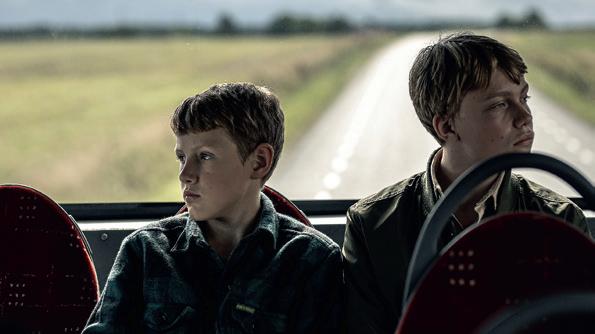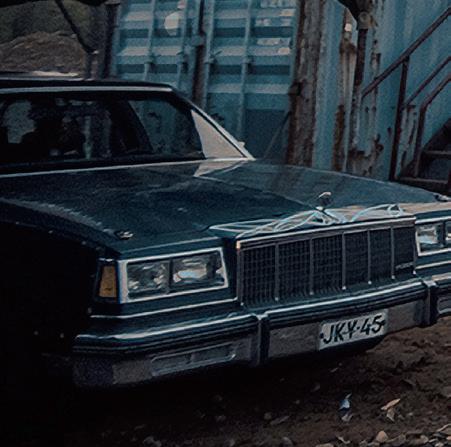
5 minute read
REVIEW Rain
On Estonian the Big Screen Man’s Burden
Estonian man has been the butt of many jokes. No wonder, because he’s quite a comical character from certain angles. Have you heard the old joke about an Estonian who loved his wife so much that he almost told her?
According to natural laws, incontestable forces beyond our control, every brighteyed, sensitive and lovely boy is likely bound to become a sighing grown-up male individual on a couch, with ugly pants and few words, whose burden is only slightly lifted in the blissful zone between the third and fifth beers, where said individual can end up with a lower or higher frequency, depending on the exis-
Ink Big!
The critics have done their job
tential arrangement. The circle of life.
In his debut feature Rain, Janno Jürgens (who has dedicated the film to his brothers) has concentrated on this glum and joyless circle handed down from generation to generation, and its pattern of complete inability to express your feelings. The only familial ties are solidarity born out of mutual sufferings at best, or time spent together consuming unhealthy food products prepared by the female counterpart of the family, at worst. Discomfort, unspoken problems, loneliness amongst the crowd. Jürgens explores this model by example of a rather typical Estonian small-town family and tries to figure out how it works and why it is passed on. There are three men in the middle of the story – elderly and gray Kalju (Rein Oja), Rain (Indrek Ojari), a man in his late thirties, and Ats (Marcus Borkmann) in his early teens. They all represent different generations, and different periods in time. The title seems to imply that Rain is seen as the protagonist, but as the worn-down prodigal son returning home to his parents’ house, he is mostly a catalyst, the initiator of events. Jürgens’ story (co-written

with Anti Naulainen) is told through the innocent child’s eyes of Ats.
Rain looks at the dynamics of relations between three men, but there are women in the background, trying to work out the men. Kalju still loves his spouse (Laine Mägi) who is in turn seduced by a rogue ethnic dance enthusiast Uuno (Ivo Uukkivi). Rain falls for a Slavic beauty Alexandra (Magdalena Poplawska) with a sketchy background, and Ats is simultaneously drawn to his friend’s sister’s perky tits and the mysterious red-headed girl next door.
Jürgens has opted for a contemplative, reserved and suggestive narrative style. The scenes are not filled with talk or stuffed with unnecessary dialogue. It has often familiar, sometimes comical and partly even tragic overtones, carried by exchanges like: “Tell me” / “Say you what” / “What happened” / “Nothing”, etc.
The director’s primary intention is not to make you understand everything right away, but to make you feel for the characters and think along with them. The key is
Indrek Ojari received the Best Actor’s Award from the Cultural Endowment of Estonia for his work in Rain. in the minor details: the direction of the gaze, shiver of cobwebs, a slightly greedy gulp from a beer glass. This sort of storytelling technique really benefits from the support of strong cinematography (again a masterful job by DoP Erik Põllumaa), and even more so, from the actors. First, you have to make the absolute correct choices already in casting, and second, the actors have to feel natural on the screen. When the dialogue is sparse, everything else comes in play, but the camera mercilessly amplifies every eye roll, fake hand gesture or slammed door. Mannerisms and exaggeration kill all beauty, but give it too little, and the story remains untold. Jürgens has done good work with the actors, besides the main roles, praise should be reserved for Meelis Rämmeld for a strong supporting role.
Rain’s time period is intentionally left open. Ancient tape recorders and reel-to-reel decks co-exist with some fairly modern details. In any case, it is all part of the succumbed atmosphere of a small town by the sea, without metrosexuality, vegans or smartphone addiction. Jürgens has cleaned his world of all of that. All that we are left with is the feeling of childhood coming to an end. Joyful, careless games are starting to get affected by the anxious pre-knowledge of all these scary, forbidden, “adult” things that lie ahead.
Some scenes expose an homage to one of the most important Estonian cinematic texts about alienation, Veiko Õunpuu’s Autumn Ball. Clearly an influence on Rain in many respects, including the visual similarity between Õunpuu’s Lasnamäe and Jürgens’ Sillamäe. Both of them constructed their own fictional time-space in their debut features, juxtaposing details from different decades. Parallels can also be seen in the retro-tinged soundtracks of both films.
Ats’ narrative arc – starting with the opening shots of him and his friends diving in a harbour on a hot summer day and finishing with him ending up in the same location under quite a different set of circumstances – is an example of a classically envisaged coming-ofage story. Sadly, father Kalju’s character is sort of left to hang. As he is one of the key figures in the story, you would want more information about him to fully understand the reasons why his relationship with Rain is so tense. On the other hand, the silent, introvert father figure is always an enigma, and probably the authors have decidedly allowed him to be that.
Music – diegetic, as well as non-diegetic – is a bit too frequent for my personal taste. Rain’s overall subdued style could have been more powerful entirely without the support of any music in some scenes. That would also give more prominence to the tracks and themes that really matter in the film.
But enough said. Jürgens’ film is a success, no doubt about that. Now there’s only hope that all these talented debuts of recent years will be swiftly followed by the second and third films, allowing them to develop and find their voice. EF

Rain
By Maria Ulfsak First published in Eesti Ekspress










